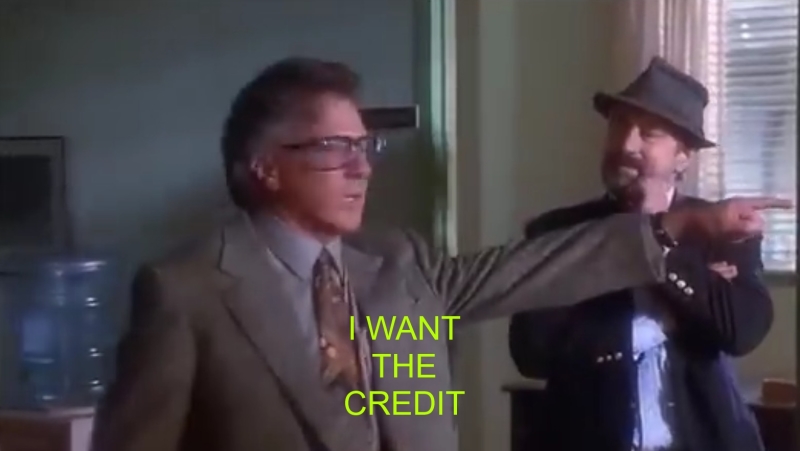Encourage new ideas and more productive dialogue by giving idea-originators the credit they’re due
Late in 2011, I first put pen to paper, or fingertips to keyboard, to describe an idea that had been bouncing around in my mind for several years—at least since Larry Summers’s public defenestration from Harvard in 2005. The idea was that women’s unprecedented mass entry into public life, in the US and other Western societies, had been “feminizing” public discourse and policy—leading among other things to the rise of political correctness culture, the increasing suppression of free speech, and the decline of capital punishment—due to women’s different way of thinking about the world.
I wasn’t a professional opinionator—just an amateur with a background in journalism. But I did have a website where I published occasional essays, which were read by a few hundreds to thousands of people every month, and there I first set down my thoughts in a short piece about the demise of the male cognitive style. In the ensuing decade, I developed the basic idea in further essays, including in two web magazines with significant readership. I joined Twitter to promote these essays. Eventually I had some recognition as an introducer of this idea.
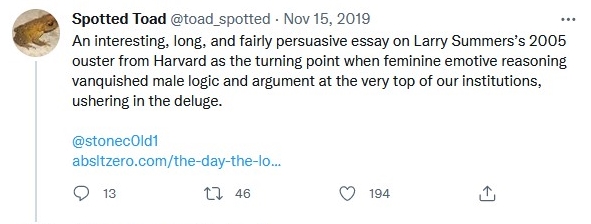
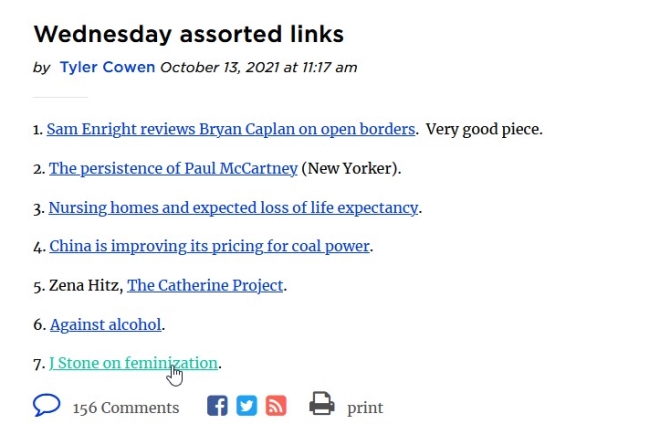
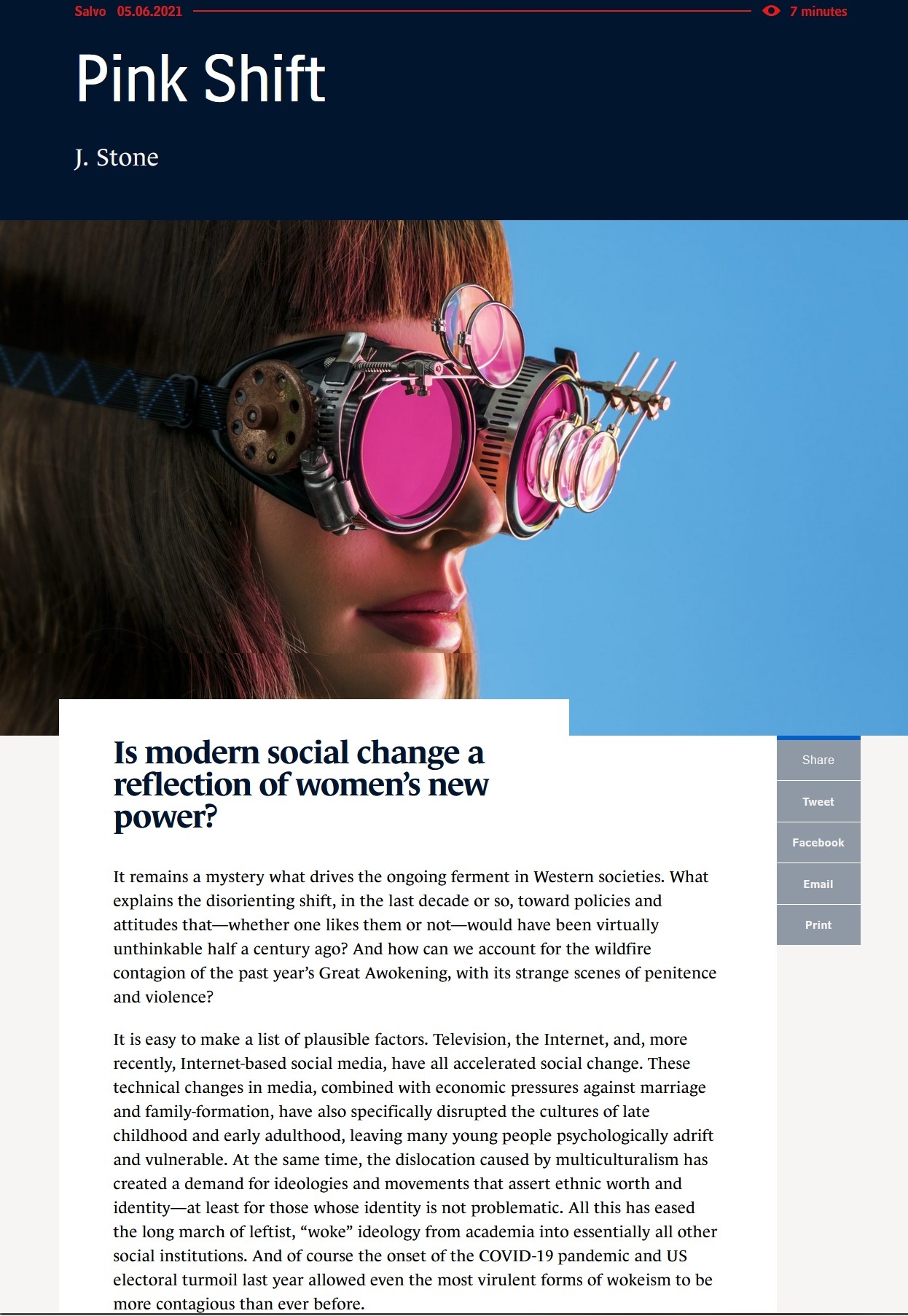
The idea of cultural feminization became more and more obvious in the wake of the Great Awokening, which appeared to be a heavily female-dominated social phenomenon. One writer after another began to notice and embrace the cultural feminization idea as their own—either not knowing of my (and others’) prior contributions, or knowing of them but not considering them “big” enough, in terms of readership and public awareness, to acknowledge them.
I may be ultra-sensitive on this topic, because some of my past journalistic work has been used by others with inadequate attribution (or none). I am also aware that this is a very personal kind of pain, one that tends to attract little sympathy from those who have not had a similar experience.
Still, I think there is an objective case to be made, wholly apart from my own gripes, that “inadequate credit to originators of ideas” (ICOI?) is a legitimate social problem whose solution would materially benefit society. Why? Simply because denying people credit for developing original ideas effectively disincentivizes them from making the effort to develop those ideas, and in that straightforward sense is likely to retard human progress. Obscuring past expressions of an idea also limits new discussions of that idea when they do occur—people are constantly “reinventing the wheel.”
We acknowledge this logic in other domains of knowledge production. The new ideas of scientists, doctors, English Lit experts, etc. are protected and made accessible by the searchability of their formal papers (via the PubMed system, for example) and the citation custom. New technical ideas also are protected and made accessible by the patent system and its strong judicial backing. Books, musical compositions, movies, TV shows, are protected—albeit weakly—by the copyright system.
Unfortunately, when it comes to ordinary, non-patentable, non-copyrightable ideas that are published in informal, non-academic fora—ideas such as “women’s mass entry into public life has feminized institutions, culture and policy”—there is no legal protection, and no good and searchable repository. Moreover, the principal search engines for web-based material aren’t really designed to uncover the origins and subsequent iterations of ideas. Mainly because of this, there is only a very weak cultural enforcement of priority claims by idea-originators. I observe anecdotally, for example, that Twitter is full of DIY experts who (from lack of knowledge and/or lack of scruples) recycle others’ ideas, framing their contributions as new, though they are unoriginal and are often incomplete/undeveloped compared to the true original. Thus, the true originators are discouraged by not getting credit, and the false ones lead everyone in circles instead of moving the discussion productively forward.
Solutions?
In a broad-brush way, I imagine two complementary solutions to this problem. One is to develop a “registry of ideas.” The other is to develop an “idea history” search engine/bot.
The registry of ideas could have a broad structure like the “motif index” developed by the anthropologist Stith Thompson in the 1930s to record and categorize folkloric tales according to their different elements or “motifs.”
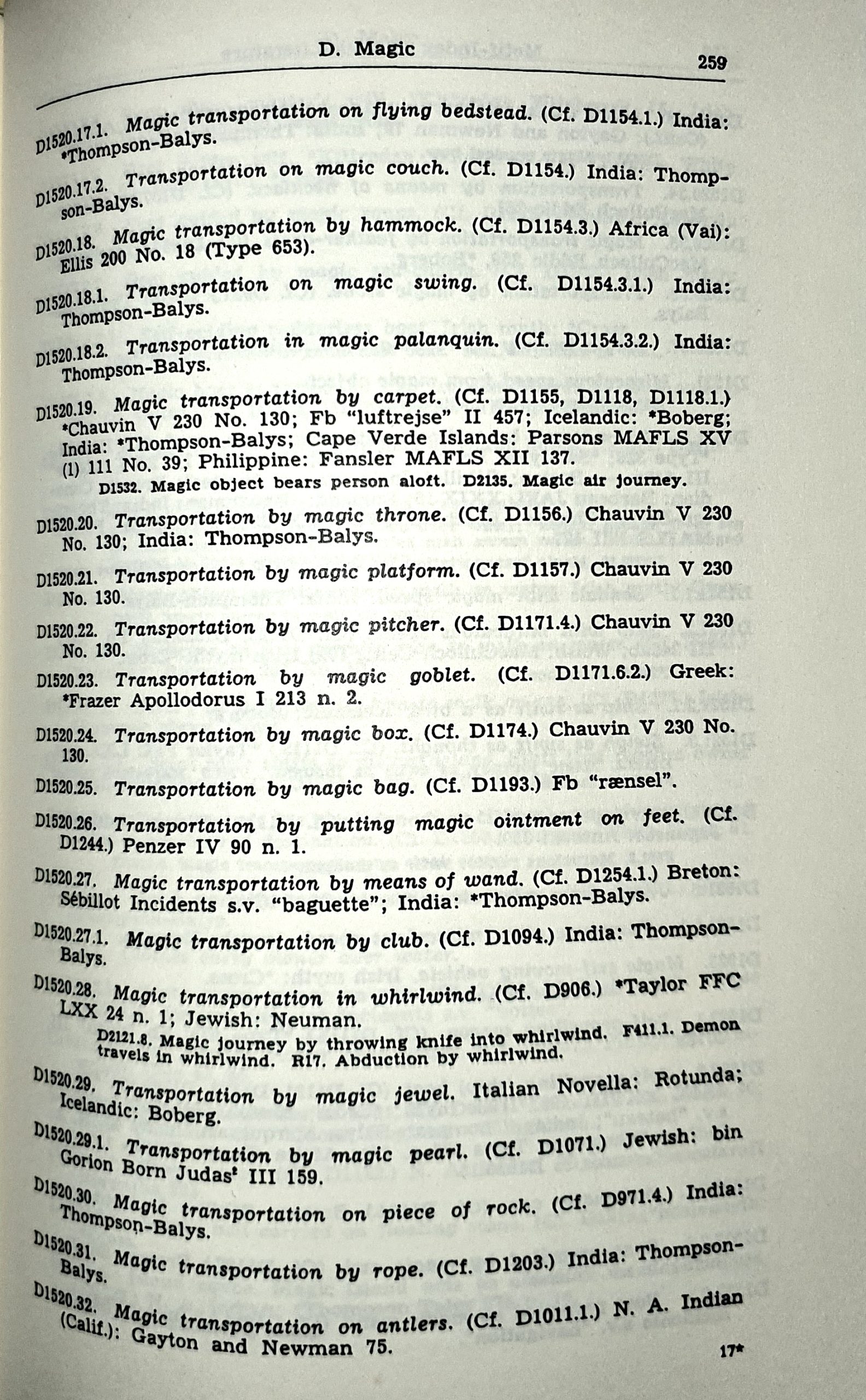
The Dewey Decimal System, by which librarians decide where to shelve books, and the aborted Google “Knol” project, offer other potentially helpful models of topic-categorization.
I imagine that some organization like the Wikimedia Foundation (Wikipedia’s parent) could provide some initial structure and guidelines for such a database, after which it would be assembled and curated by volunteers in a highly distributed manner—like Wikipedia. Idea-originators could directly submit their work for recording in the registry, as they can now for appropriate intellectual property with the patent and copyright systems, or they could just let the curators detect their work (assuming it had been published) with their specially designed web bots and other search tools.
Those tools would be powered by “idea history” search algos, which would parse natural language text to identify ideas being expressed, and categorize them—at least as a “first pass” effort to be checked by human curators of different idea domains, though AI tech may soon be able to handle such tasks on its own.
I suppose one objection to this whole idea—this idea about ideas—would be that ordinary writers, especially casual self-published essayists and social-media posters, won’t submit to a citation system the way academics do. I think, though, that to a great extent, ordinary writers already do follow the custom of citation. These days (unlike, say, 50 years ago) a large majority of young adults in the US have had some college experience, with the exposure to citation rules that entails. More importantly, the internet with its “hypertext” ability that can easily link text to other documents anywhere on the web has made citation of others’ work routine even for the most casual writers. The only things missing, really, are the search engines and repositories that would help to fully routinize the assignment of priority, rewarding creativity appropriately, and plausibly making even our humdrum, everyday dialogue a bit more rigorous and serious.
* * *
